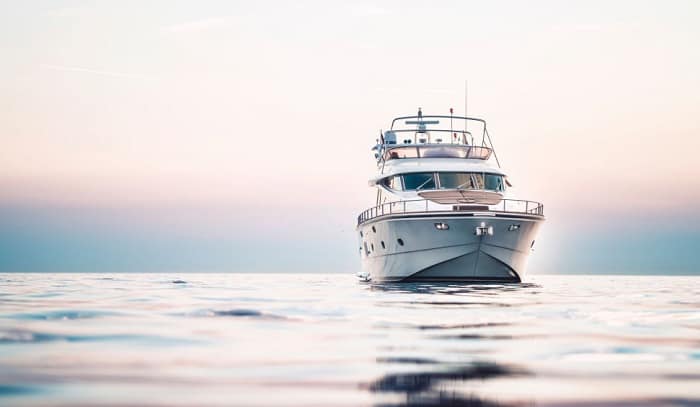You are having the time of your life as you venture towards the calm waters, but suddenly your boat is on fire. What should you do if a fire breaks out in the front of your boat? I get this question a lot, and I realized how important it is to talk about this sensitive topic.
Fires in a boat may start at any time and place. Electrical and off-boat sources are the most common causes of boat fire accidents. Regardless of what its root may be, it still produces the same result, which is destruction.
Hence, I would like to share the steps you should take in case this horrible scenario happens to you.
Table of Contents
Procedures to Follow When Your Boat’s Front Catches on Fire
If there is a fire in front of your boat, you must:
- Cut the boat’s engine, petrol supply, and gas cylinders
- Turn the boat so that winds sweep the flames away
- Send out a distress call
- Turn on fire extinguishing devices
- Gather passengers for evacuation preparations
- Fight the spreading fire with a fire extinguisher
Continue reading for details of each step you should take!
Different responses are available depending on several factors like the fire’s location on your boat and its severity. Here, we will discuss the steps you should perform when a fire breaks out in front of your boat.
1. Switch off your boat’s engine, petrol supply, and gas cylinders immediately.
If you leave the engines going, all kinds of things will go wrong. Your engine may overheat, exacerbating the burn, or more fuel may combust when it enters the engine. To avoid further problems, you should first turn off your engine.
Aside from turning off the engine, you can also switch off the petrol supply. No fuel can spill out if your fuel flow is cut off. Further, switch off any gas cylinders on the cruise. The aim of this measure, once again, is to ensure that no gas leaks occur, which would accelerate the risk of an explosion.
2. Turn the boat in such a way that the wind sweeps the flames away from untouched areas.
Your boat’s position from the wind will significantly assist you in reducing further damages. Suppose the fire is in the bow. You can turn your boat’s front where the wind blows to it. The breeze from the stern will keep the fire from spreading to other areas of your ship.
This tip is also helpful if a fire breaks out on any other side of the boat. Although the wind cannot extinguish the fire on its own, using it to your advantage will keep you, your crew or passengers, and the other parts of your boat safe.
3. Send out a distress call.
A distress call will warn any nearby vessels that your boat is in danger. You can also contact emergency responders directly if you have a mobile phone signal. When you contact emergency services or the Coast Guard, inform them of the following:
- Your current position.
- Your boat’s kind and scale.
- Your boat’s name.
- The number of passengers.
Visual signaling devices like flares, and sound signaling devices like air horns and whistles, help send a distress call. Moreover, you can use a VHF radio to call for help quickly.
4. Switch on the fire extinguishing devices.
A fixed fire protection device in critical places, such as the engine compartment or kitchen, is a must-have on any boat that can accommodate it. A steady device enables you to indulge in remote and enact fire suppression.
5. Gather the passengers to get them ready for evacuation.
Instruct your passengers to wear their life jackets and tell them about your evacuation plan, if necessary. When the fire grows beyond your control, immediately launch a life raft or have someone else do it for you.
6. Use a fire extinguisher to put out the fire.
Fight the fire with the available fire extinguisher onboard. Experts suggest using marine-grade fire extinguishers rather than water because they can put out flames caused by gasoline and oil.
If you don’t have an extinguisher or are currently planning to replace your old stock, you can try using the FIRST ALERT FE1A10GR195. Having an extinguisher is not enough. You should also know how to use one. Let me show you how to do it.
- Pull the top pin of the fire extinguisher.
- Aim the fire extinguisher at the fire’s foundation.
- Squeeze the extinguisher’s handle.
- Sweep the hose from one hand to the other to protect as much of the flames as possible. If nothing else works, abandon the ship.
How to Prevent a Fire from Breaking Out in Your Boat
You will never be completely immune to burning, but you should always be prepared to deal with flames in addition to protection.
- Install a fixed fire suppression system.
- Install smoke detectors.
- Adhere to the Fuel and Power Safety Procedures.
- Always conduct fire drills and safety briefings.
Boat Tips that Every Boat Owner Should Consider
Besides boating safely, there are other tips that every boat owner should be aware of, precisely the things to do before and after a fire.
Before a Fire Breakout
The tips below are done before a fire breakout, meaning you should do these techniques daily.
- Ensure Your Boat Has A Marine Fire Extinguisher
You should check that the fire extinguishers are in good working condition. Properly dispose of such an article that is beyond its shelf life. Moreover, place your fire extinguisher in a place where you can access it quickly whenever needed.
- Check Your First Aid Kit
First aid kits are essential to have onboard to easily tend to wounds, cuts, and abrasions onboard. Thus, make sure that all products in your kit are still usable and clean.
- Always Wear A Life Jacket
It is essential to wear a life jacket at all times once you stepped inside your boat. This is to ensure that you are saved if you fall into the water while traveling.
- Examine Your Inventory
Check that all your tools and equipment, like a medical kit, extra oars or paddles, heavy-duty flashlight, an essential toolbox, etc., are complete before departure. You should also prepare personal flotation devices, wearables and throwables, that are working and easy to use.
- Brief Your Passengers About the Safety Protocols
Among the most critical duties of boat owners is always to discuss safety protocols, such as wearing life vests, what to do inside the boat, and the like, before starting your trip. This ensures that your passengers are aware of the steps they should take in case of an emergency.
After the Fire Set In
The following are some tips that you should do once the fire on your boat has been controlled.
- Secure The Location
Keep the fire site safe from further destruction caused by wind, robbery, or vandalism. Don’t leave the platform unattended. Your duty as the owner is to ensure that all openings are protected from rain and foreign entry.
Check carefully that the property’s exterior doors are closed and guarded. The fire and rescue team will assist you with securing the property before liability is passed to the occupier or insurance provider.
- Precautions
The fire and rescue team will contact the nearby gas, diesel, and energy provider to disconnect supplies before leaving the scene. If a utility (gas, power, or water) is disconnected, do not try to reconnect the service on your own.
Let a professional electrician inspect any water-damaged electrical wiring before restoring the electricity onboard. Additionally, be careful of structural damages, such as weakened boat roofs and floors.
- Filing Insurance Claims
Contact your insurance officer directly. The earlier you notify your insurance company, the faster they will handle your insurance report. After your notification, the insurance assessor will conduct the investigation.
Create an inventory, which lists items destroyed by fire as quickly as possible. This will help expedite your lawsuit. Additionally, do not throw out any defective items before the investigation is complete.
- Recover Your Belongings
Items burned in a fire are usually insured. You may collect the absolute monetary value of the lost goods at the time of settlement. So, keep a belongings home list, containing the purchase’s date, the cost at the time of sale, and a description of each piece.
- Other Tips
Take note of the mental welfare of the kin.It is sometimes impossible to deal with the aftermath of a disaster. So, be gentle with yourself as you work through the tension brought on by the fire. Get immediate help if you or someone in your passengers are having trouble coping.
Conclusion
To recap, before anything else, ensure that you equip your boat with workable emergency kits. If the preventative efforts, like setting up an automatic fire control device, fail, follow these simple steps:
- Contact emergency responders. They will be able to work with the fire more quickly than you.
- Meanwhile, switch off the engines and fuel lines.
- Try to manage the flame.
- Brace your passengers for evacuation.
By following all the legal advice from fire experts, it is vital to keep in mind that each fire scenario is different and thus, can necessitate a somewhat different course of action.

“I am James Harvey – founder of Boating Basics Online. It is established with the drive to help out first-time boaters, which are those desiring to explore their way through the water. So if you are new to boating, start from here with me. “


